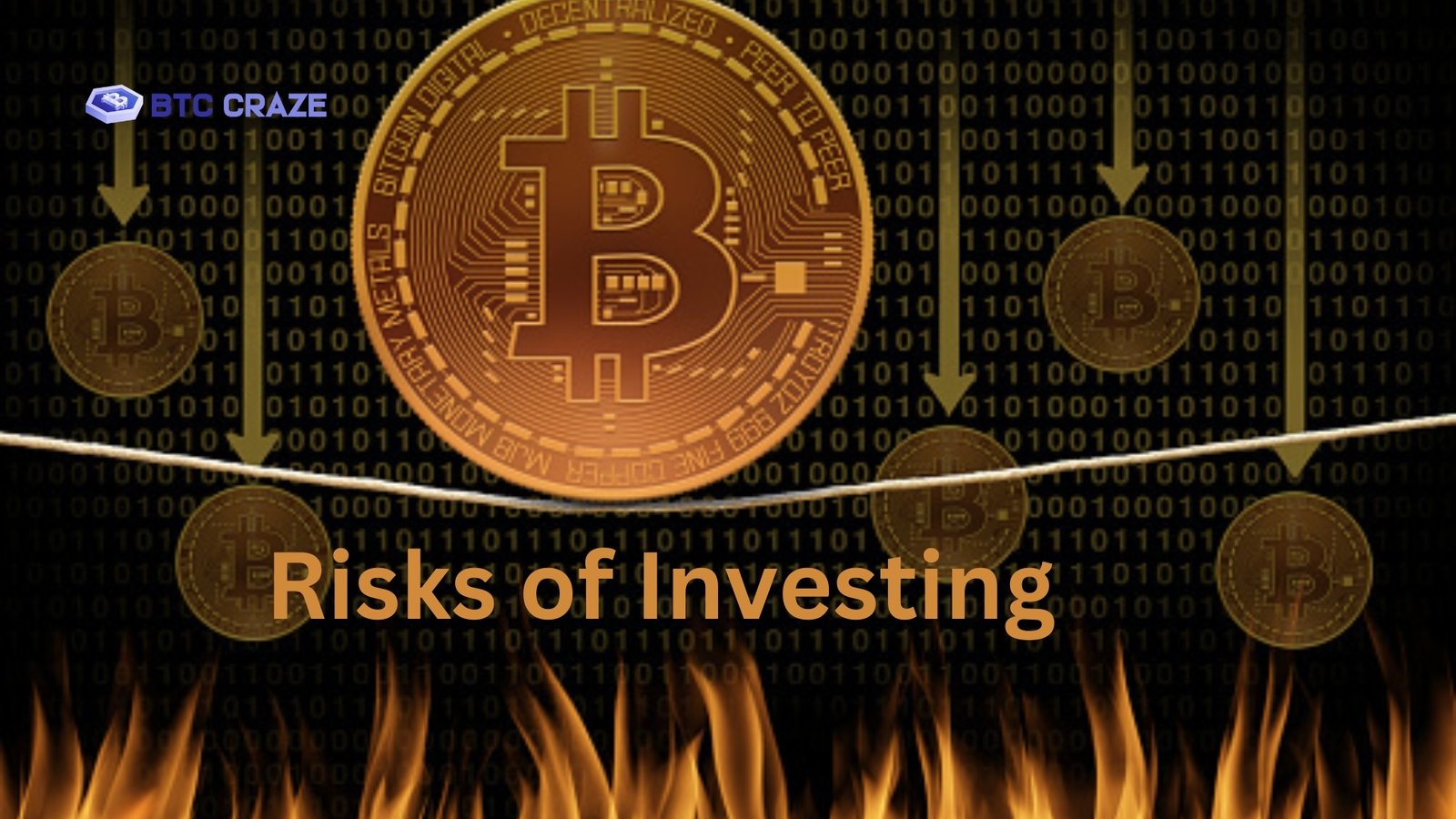Is It Safe to Invest in Bitcoin? Since its launch in 2009, Bitcoin has generated much curiosity, doubt, and heated discussion. Bitcoin has drawn the interest of investors worldwide with its explosive increase in value and status as a digital gold standard. However, one important question still stands, even in 2024: Is it safe to invest in Bitcoin? No straightforward “yes” or “no” response to this query exists. Although there are ways to make money with Bitcoin, there are also many hazards involved. It’s critical to weigh the advantages and disadvantages of investing in Bitcoin and the larger cryptocurrency market to make an informed choice.
The Basics of Bitcoin
Bitcoin operates on a decentralised peer-to-peer network, meaning any entity, such as a bank or government, does not control it. User trust, security, and scarcity contribute to its value. Miners are nodes in the Bitcoin network that safeguard and confirm transactions recorded in the blockchain.
Bitcoin is both revolutionary and extremely volatile due to its decentralized nature, allowing it to function outside existing financial structures. From its humble beginnings as an asset class reserved for tech-savvy fans, Bitcoin has become a mainstream alternative. A growing number of major entities, including governments, corporations, and hedge funds, are adding Bitcoin to their holdings.
Benefits of Investing in Bitcoin
Potential for High Returns
The possibility of large profits is a major selling point of Bitcoin. Compared to more conventional investment options like equities or gold, Bitcoin’s returns over the last decade have been staggering. Early Bitcoin buyers have seen their money increase at an exponential rate. As an example, the price of Bitcoin skyrocketed from a few pennies in 2009 to an unprecedented level of over $69,000 in 2021. Bitcoin has given long-term investors substantial returns despite incredibly volatile periods.
Inflation Hedge
People often refer to Bitcoin as “digital gold” because of the belief that it can protect investors against inflation. With only 21 million coins in circulation, the rising demand for Bitcoin could cause its price to skyrocket due to its relative rarity. Bitcoin has been considered a haven during extreme inflation when the buying power of fiat currencies declines.
Decentralization and Security
Bitcoin does not need a central authority because of its decentralized design. It is extremely difficult to alter or forge transactions using cryptographic techniques. Blockchain technology, which underpins Bitcoin, makes documents immutable and publicly accessible, which boosts trust in the system. In contrast to fiat currencies, which are susceptible to inflationary policies, Bitcoin’s fixed supply assures scarcity, which enhances its value as a long-term asset.
Adoption and Institutional Interest

The realm of Bitcoin has expanded beyond individual investors. Bitcoin now has more credibility thanks to the market participation of institutional entities. Some governments, along with companies like MicroStrategy and Tesla, have included Bitcoin in their financial statements, indicating that they believe in its potential for long-term success. Traditional investors can now acquire exposure to Bitcoin through exchange-traded funds (ETFs), eliminating the need to handle the intricacies of Bitcoin ownership and storage.
Diversification
Bitcoin gives people a chance to spread their money around. Stocks and bonds, considered traditional assets, experience market volatility that is impacted by economic cycles, government policies, and corporate performance. While these factors affect Bitcoin’s volatility, it functions relatively independently and provides a diversification option if other markets experience downturns.
Risks of Investing in Bitcoin
Volatility
The tremendous volatility of Bitcoin is the biggest danger it poses. The value of Bitcoin has fluctuated wildly since its start. If you bought at the high in 2021, you lost a ton of money because it dropped to under $16,000 in 2022. Investors continue to be concerned about the volatility in 2024. Large and unexpected price shifts might occur due to abrupt regulation changes, macroeconomic events, or technical breakthroughs.
Lack of Regulation
Bitcoin functions in a world that is mostly uncontrolled. This exposes investors to dangers, but it can be beneficial regarding privacy and autonomy. The worth and liquidity of Bitcoin might take a hit if different countries’ regulators crack down on the cryptocurrency. Investors face unpredictability in 2024 as some nations welcome Bitcoin while others, such as India and China, impose severe restrictions.
Security Risks
The Bitcoin network is impenetrable, but the exchanges and platforms that let users buy, sell, and store Bitcoin are not immune to hacking. Investors suffered heavy losses due to high-profile exchange hacks like the 2014 Mt. Gox catastrophe. Bitcoin investors must prioritize their security due to the persistence of security threats such as hacking, phishing, and the loss of private keys, even though security has improved.
Environmental Concerns
Energy consumption is high during Bitcoin mining. The environmental impact of Bitcoin, according to its detractors, is unsustainable, and this energy consumption is a contributing factor to climate change. Because of its potential impact on the environment, Bitcoin may turn off potential investors. The environmental controversy surrounding Bitcoin is far from over, even though there are initiatives to increase the usage of renewable energy in mining.

Technological Risks
The future of Bitcoin is tied to its ability to be developed and adopted technologically. Bitcoin may face competition from newer blockchain technologies and cryptocurrencies. Some worry that Bitcoin will be surpassed or rendered obsolete by newer technologies, such as Ethereum, which has smart contract functionality. Bitcoin still has a significant first-mover advantage, but investors should keep the changing tech landscape in mind.
Lack of Consumer Protection
Bitcoin investments lack the same degree of consumer protection as more conventional bank accounts or investments. There is practically no way for an investor to get their money back if they misplace their private keys or transmit Bitcoin to the incorrect address. Bitcoin investors are solely responsible for their assets because there is no regulatory authority to seek compensation in case of fraud or mistake.
Mitigating Risks
Although investing in Bitcoin has risks, there are ways to lessen those risks.
- Invest Only What You Can Afford to Lose: It is crucial to treat Bitcoin as a high-risk investment because of its volatility. Never put all your money into Bitcoin; instead, invest only a portion of your income you can comfortably lose. To reduce risk exposure, diversify your holdings among traditional assets and devote a smaller portion of your portfolio to Bitcoin.
- Use Secure Platforms: Only transact on trustworthy and secure exchanges while purchasing or selling Bitcoin. Instead of leaving your Bitcoin on exchanges, use a hardware wallet and enable two-factor authentication. Always have a backup of your private keys.
- Stay Informed: Innovations appear frequently in the crypto industry, which causes it to change continuously. Keep updated on the latest regulatory news, tech developments, and market trends affecting Bitcoin’s value. Before making any substantial investments, it could be wise to seek the advice of financial professionals or cryptocurrency specialists.
- Long-Term Perspective: Bitcoin’s price is highly volatile in the short term but has a track record of substantial growth in the long run. You might have a greater chance of surviving short-term volatility if you plan to keep Bitcoin for years instead of months.
Conclusion
Investing in Bitcoin in 2024 is still dangerous, but the payoff could be worth it. This investment does not meet a “safe” investment definition due to its volatility, regulatory uncertainty, and security threats. Still, it does provide unique prospects for high returns and diversification. It is crucial to exercise caution, conduct thorough research, and comprehend the dangers associated with Bitcoin before adding it to a diverse investing portfolio.
Your understanding of the cryptocurrency market, risk tolerance, and investing objectives will determine the ultimate safety of your Bitcoin investment. Those not afraid to take risks can still find big profits with Bitcoin. However, Bitcoin might not be the most secure option for individuals looking for consistency and reliability.
Also Read: Bitcoin Volatility: The Wild Ride of Crypto Markets Revealed
FAQs
Is Bitcoin a safe investment in 2024?
Bitcoin is a high-risk investment with high-reward potential. Because of its volatility, prices could fluctuate wildly in a short period of time. The potential for large earnings belies the fact that it is not a “safe” investment option when compared to bonds or blue-chip companies. One must ascertain their risk tolerance prior to making prudent investments.
Can Bitcoin act as a hedge against inflation?
A lot of people think of Bitcoin as a way to hedge against inflation and a digital gold alternative. Its limited supply of 21 million coins protects fiat currencies against depreciation, especially in times of high inflation. However, its price volatility may undermine its stability as a store of value.
What are the main risks of investing in Bitcoin?
Most notably, Bitcoin mining is very energy intensive, which poses environmental problems, regulatory uncertainty, security flaws (such as hacking or losing private keys), and a lack of consumer protection. Potential backers should carefully consider these risks before making any investments.
How can I secure my Bitcoin investment?
Use a hardware wallet, enable two-factor authentication (2FA), and trade on reputable exchanges to keep your Bitcoins safe. Avoid phishing and other types of fraud; it is critical to have a backup of your private keys.
Is Bitcoin regulated in 2024?
Despite variations in legislation among nations, Bitcoin operates in a mostly unregulated market. Some governments, like the US, regulate cryptocurrency transactions, while others, like China, ban or severely restrict them. It is critical to keep an eye on regulatory changes since they can impact Bitcoin’s value and liquidity.

